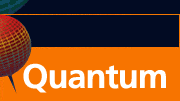CONTACTS
- Coordinator
Adolfo del Campo
-
Quantum Lunch Location:
T-Division Conference Room, TA-3,
Building 123, Room 121
 |


Quantum Institute: Visitor Schedule
The Quantum Lunch is regularly held on Thursdays in the Theoretical Division Conference Room, TA-3, Building 123, Room 121.
The organizing committee includes Ryan O. Behunin (T-4 & CNLS), Malcolm Boshier (P-21), Adolfo del Campo (T-4 & CNLS), Michael Di Rosa (C-PCS), Ivar Martin (T-4), Changhyun Ryu (P-21), Rolando D. Somma (T-4), Christopher Ticknor (T-1), and Wojciech H. Zurek (T-4).
For more information, or to nominate a speaker, contact Adolfo del Campo.
To add your name to the Quantum Lunch email list, contact Ellie Vigil.
Thursday, April 12, 2012
12:30 PM - 2:00 PM
Speaker: Jess Riedel (T-4/T-CNLS)
Technical Host: Wojciech Zurek
TOPIC: Decoherence, Quantum Darwinism, and the Real World
Abstract
Common observations suggest the existence of an objective classical reality, i.e. a universe where the macroscopic variables are imprinted redundantly in the environment, so that many observers can independently infer a set of common facts. However, this implies a quantum state which is highly exceptional in the global Hilbert space. We clarify the origins of such an exceptional state in two ways: First, we calculate the quantum mutual information between an object illuminated by a black body and the photon environment for blackbodies that cover an arbitrary section of the sky. In particular, we demonstrate that more extended sources have a reduced ability to create redundant information about the system, in agreement with previous evidence that initial mixedness of an environment slowsóbut does not stopóthe production of records. Second, we examine conditions needed for the creation of branching states and study their demise through many-body interactions in a model universe of qubits. We show that even constrained dynamics can suppress redundancy to the values typical of random states on relaxation timescales, and prove that these results hold exactly in the thermodynamic limit.
|


